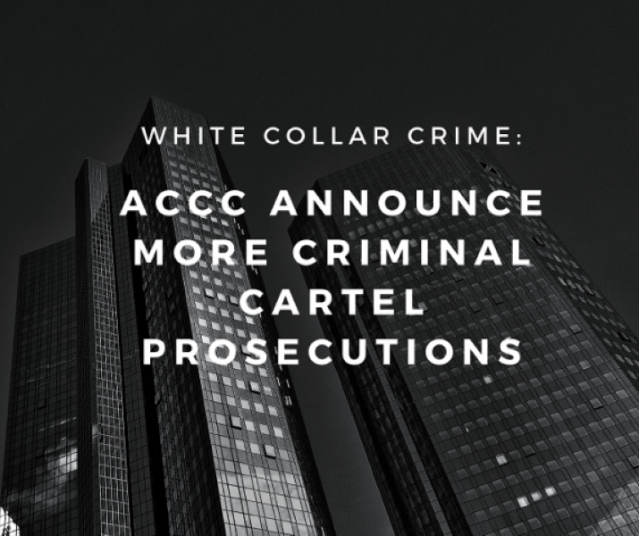
In his annual address to the Committee for Economic Development Australia this week, the ACCC Chair Rod Sims laid out its 2019 priorities. First among these was its “competition enforcement approach and objectives”.
The ACCC will aim to have two to three criminal cartel investigations come to conclusion and prosecutions commence each year. This is a significant announcement, and suggests that the ACCC not only views criminal prosecutions as a central enforcement and compliance method, but also that cartel arrangements among some of Australia’s largest corporate entities as various and widespread.
Mr Sims noted their focus will be on the new misuse of market power and concerted practices provisions.
Cartel Conduct
Cartel arrangements are regulated under the Competition and Consumer Act 2010 (Cth). Central to the provisions is the concept of “cartel provisions” under Section 45AD.
In short, a contract, arrangement or understanding between parties is a cartel provision if it:
1) fixes, controls or maintains a price, discount, allowance, rebate or credit; or
2) prevents, restricts or limits production or allocation of goods, the capacity to supply or the supply of goods; or
3) limits or artificially restricts the bidding process in relation to the supply or acquisition of goods or services.
Cartel Offences
Cartel offences are divided into criminal and civil provisions.
Criminal Provisions
Sections 45AF and 45AG make it an offence if a corporation makes a contract or arrangement containing a cartel provision, or gives effect to the cartel provision.
This is a criminal provision and what must be proven is that the corporation knew or believed that the contract, arrangement or understanding contained a cartel provision. Negligence, or what a corporation “would have known” is not enough. As this a criminal offence this must proven beyond a reasonable doubt.
The maximum penalties are substantial. They range from a fine of up to $10,000,000, or if the court can determine the total value benefit of the cartel arrangement, 3 times that total value. Further, it can also impose a fine of 10% of the corporations annual turnover.
Civil Provisions
The provisions in sections 45AJ and 45AK regulate the same conduct as the criminal provisions, but only have to be proven on the balance of probabilities.
Prosecution of Corporations
As offences relating to Cartel Provisions are federal offences involving corporate criminal responsibility, provisions of the Commonwealth Criminal Code 1995 can also apply. Specifically, Division 12 of Part 2.5.
Importantly, because the offences require knowledge or belief, section 12.3 of the Criminal Code provides that the knowledge or belief must be attributed to the corporation that authorised or permitted the commission of the offence.
Authorisation or permitting can be established by proving:
1) The board of directors carried out the conduct or authorised it; or
2) A high managerial agent engaged in the conduct or authorised it; or
3) A corporate culture existed within the corporation that directed, encouraged, tolerated or led to the non-compliance; or
4) The corporation failed to create and maintain a corporate culture that required compliance with the relevant provision.
Authorisation can be by express, tacit or implied.
When does prosecution happen? – “Serious Cartel Conduct”
The ACCC is responsible for investigating and obtaining evidence of cartel conduct. The Commonwealth Director of Public Prosecutions (CDPP) is responsible for prosecuting serious cartel criminal offences.
Both entities entered into a Memorandum of Understanding (MOU) regarding Serious Cartel Conduct on 15 August 2014.
Under the MOU, the ACCC refers serious cartel conduct to the CDPP to consider prosecution action. The ACCC will consider conduct to be “serious cartel conduct” if it believes certain factors to be present. These include:
1) the conduct was covert;
2) the conduct caused, or could have caused, large scale or serious economic harm;
3) senior representatives of the corporations were involved in authorising or participating in the conduct.
Immunity – “First in the Door”
In certain circumstances, corporations can be granted an immunity from prosecution if they agree to cooperate with the ACCC and CDPP in an investigation or prosecution against a criminal cartel.
Whether an immunity is granted will depend on whether another corporation has already applied for an immunity. This is known as the “first in the door” approach.
A decision to grant an immunity against criminal prosecution is made by the CDPP, normally after a recommendation is made by the ACCC. The factors it considers are set out in the Prosecution Policy of the Commonwealth. These include:
1) The corporation or individual must have been a party to the cartel, and must admit that their conduct may have been illegal;
2) They must be the first party to apply for immunity;
3) There must be no coercion and they must have ceased involvement in the cartel.
These are significant mandatory considerations, and the requirement that they must be the first party to apply for immunity means that corporations or individuals must act quickly and obtain appropriate advice if they are to apply for immunity.
Where next?
How the ACCC apply its resources to the 2019 priorities remains to be seen. Whether current and new investigations evolve into criminal prosecutions will depend on the strength of the evidence against any alleged cartels, and whether the conduct is considered “serious cartel conduct”. Mandating a certain number of prosecutions per year, regardless of the type or nature of the evidence or conduct, would seem ill considered.
One thing is certain and the ANZ, Citigroup and Deutsche Bank prosecutions have highlighted, is that even if these prosecutions commence, getting resolution quickly is another matter.